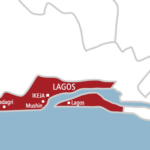With a population of over nine million people and daily influx of thousands for commercial and other activities, markets in Kano City are bedevilled by many problems, many of which have spiraled out of the confines of the markets.
For instance, Kano ranks very high among states with the problem of drug abuse in Nigeria, which many have tracked down to the proliferation of patent medicine stores in the capital city thereby leading to uncontrollable access to drugs.
- Why Nigeria’s ginger output is low
- 3 Killed, 2 injured as Amotekun operatives, herdsmen clash in Oyo State
Arrests of fake drug dealers by operatives of the National Drug Law Enforcement Agency (NDLEA) in Sabon Gari Market (Yankura Market formally Abubakar Rimi Market) are common in the state.
This is along with several other clampdowns by the police, the National Agency for Food and Drug Administration and Control (NAFDAC), among others.

Congestion inside the markets because of inadequate roads and encroachment on the available road networks close to the markets most times causes gridlock.
The Kwari Market (textile) and Singer Market (flour and confectionery) both in the heart of the city, just like the Sabon Gari Market, are major centres of congestion.
However, congestion, gridlock and other problems associated with activities in these markets may soon be issues of the past for Kano City if the words of Mohammed Aliyu, the Implementation Board Chairman for Kano Economic City (KEC), are anything to go by.
KEC also known as Kanawa International Market, situated at the entry point of Kano from the Zaria axis, is sitting on 117 hectares. The market, which is scheduled for commissioning early February, according to Aliyu, is a Public-Private Partnership (PPP) between the Kano State Government and Brains & Hammers Limited, with the former providing the land and the latter providing the investment with support from Jaiz Bank.
During a recent tour of the project, Gov. Abdullahi Ganduje explained that the pharmaceutical section of KEC became more exigent because “the government has abolished the selling of drugs anyhow.
Drugs must be sold in one particular place where the necessary regulators for the sales of drugs will be gathered.
The offices of NAFDAC will be here, offices of policemen and offices for pharmacists will be here.
They will be checking the quality of the drugs,” and added that the market, “When completed, it will be the best in the country.”

Buttressing the point raised by the governor on the pharmaceutical section of the market, Aliyu explained that the section would help address the issue of drug abuse as it had been designed in line with the federal government’s idea of trying out a Coordinated Wholesale Centre (CWC) for drugs in Kano, Lagos, Onitsha and Aba.
Aliyu explained that, “The primary target market for the project is the Kano traders who would be excited at an opportunity to expand their trades in a strategic location that provides excellent infrastructure and has heavy clientele traffic potential – local, regional and international patronage, and is easily accessible.
“Traders would be excited about shop ownership in a market that provides a desirable ambiance and offers significant levels of market dominance and a sense of trade distinction within Kano traders’ community.”
He added that, “While the primary target market is Kano, KEC would unequivocally serve other traders in Nigeria and across West Africa whose business value chain activities interlink with Kano markets and businesses.”
On his part, the Project Director of KEC, Dr Abdullahi Gambo, said the facility was conceived to address the major challenges of the existing markets in Kano.
Dr Gambo said the location of the market at an entry point of the state was also strategic because their research had been able to establish that up to 70 per cent of trading in Kano was from those coming from outside the state, as well as those from neighbouring countries like Niger Republic and Chad.
Planned to be developed in three phases, Phase I of KEC is made up of 3,000 units of shops designed for the Information Technology (IT) section popularly referred to as GSM Village; Phase II consists of 1,000 units of duplex, luxury and basic shops dedicated to pharmaceutical wholesalers; and Phase III will house a World Trade Centre (WTC), research centres, small scale industries and recreational centres.

Dr Gambo noted that the three-phase market would have at least 13,000 shops when completed, as well as a park that could contain 250 trailers at a time and that the park would be surrounded by about 500 warehouses.
He further explained that in the Phase I, they were already in talks with textile traders and hoped that traders of other goods in the city would approach them for development partnership.
Addressing the issue of affordability for traders, Aliyu said its financial partner, Jaiz Bank, had already arranged a loan scheme for those that would be needing it to purchase shops in the market, adding, however, that most of the shops had already been paid for by traders; which he said meant that the shops were affordable.
Residents and traders in Nigeria’s commercial centre remain hopeful for KEC to deliver on its promise of being a one-stop-fix for the challenges that come with the booming economic activities in the city.

 Join Daily Trust WhatsApp Community For Quick Access To News and Happenings Around You.
Join Daily Trust WhatsApp Community For Quick Access To News and Happenings Around You.

